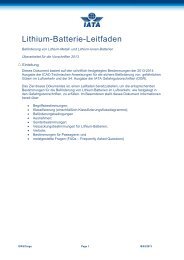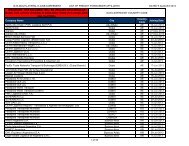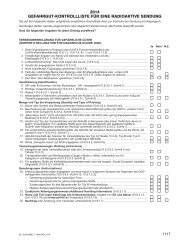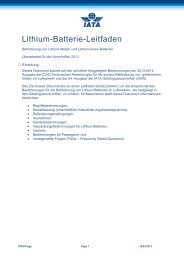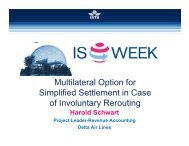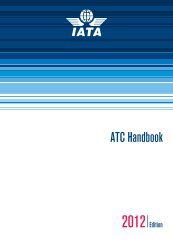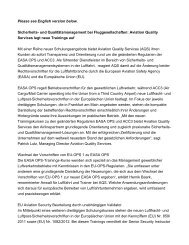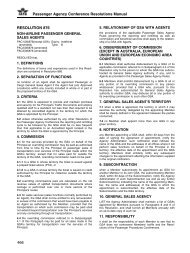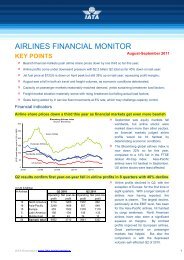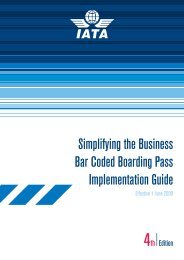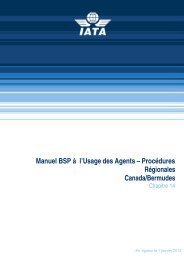Economic Regulation - IATA
Economic Regulation - IATA
Economic Regulation - IATA
Create successful ePaper yourself
Turn your PDF publications into a flip-book with our unique Google optimized e-Paper software.
LIGHT-HANDED REGULATION<br />
(PRICE MONITORING)<br />
An alternative, more light-handed approach to regulation<br />
is to use a system of price-monitoring rather than pricecaps<br />
among airports with actual or potential market<br />
power. Price monitoring regimes have been adopted in<br />
New Zealand and, since 2002, in Australia.<br />
Price monitoring adopts a backward-looking view on<br />
actual price and service quality changes to assess<br />
whether market power has been exploited. Therefore,<br />
one of the key advantages of a price monitoring system,<br />
as opposed to price-cap regulation, is that it requires<br />
significantly less resources and avoids the asymmetrical<br />
information problems associated with projecting future<br />
efficient cost levels. In addition, one of the key arguments<br />
used in Australia is that price monitoring allows airports<br />
or ANSPs more flexibility to respond to external shocks<br />
and to avoid any significant volatility in their profit levels.<br />
However, by its nature, a light-handed price monitoring<br />
system also has some disadvantages or uncertainties:<br />
No clear incentive for efficiency.<br />
Under a price monitoring scheme the objective for an<br />
airport or ANSP is to show that it has not made excessive<br />
use of its market power, not that it has delivered costs and<br />
service quality and an efficient and optimal level. In effect,<br />
airports and ANSPs can continue to operate at inefficient<br />
levels as long as prices are not altered significantly from<br />
current levels.<br />
Firms may not believe that governments wish to go to<br />
the expense of establishing or re-establishing a pricecap<br />
regime and, instead, will accept minor changes in<br />
the event of poor performance. The example of New<br />
Zealand, where Auckland Airport was found to have<br />
charged excessive prices but no regulatory change was<br />
made, demonstrates a lack of a credible sanction.<br />
Unclear impact on new investment.<br />
The implementation of price monitoring has been<br />
justified in some cases as a means of providing greater<br />
commercial freedom for airports or ANSPs to undertake<br />
new investment. However, while airports and ANSPs may<br />
feel more comfortable to invest in light of future returns,<br />
there is little influence within the system to ensure that<br />
the investment is timely and in accordance with user<br />
needs.<br />
Light-handed regulation does provide the advantage of a<br />
lower regulatory cost burden, both in terms of time and<br />
expenditure. However, as highlighted from the advantages<br />
above, the potential benefits from price monitoring are<br />
also likely to be significantly lower than with price-cap<br />
regulation.<br />
Light-handed regulation critically rests on an effective<br />
sanction and clear criteria for triggering such a sanction.<br />
Experience so far shows that these conditions are not<br />
met in practice.<br />
Exploitation of market power not defined.<br />
In the Australian and New Zealand cases there is no<br />
clear definition under the price monitoring regimes of<br />
what an exploitation of market power would involve. If the<br />
definition revolves around differences between a firm’s<br />
own prices and costs it simply reverts to a cost-plus, rateof-return<br />
system. If it relates to excessive profits, it may<br />
actually deter efficiency improvements and encourage<br />
lazy, monopolistic behaviour. In either case, the lack of<br />
clarity encourages monitored firms to push the potential<br />
limits as far as possible.<br />
Sanctions may not be effective or credible.<br />
In order for price monitoring to influence behaviour<br />
there needs to be an effective sanction in the event<br />
that market power is judged to have been exploited.<br />
Typically, the sanction proposed is a move to tighter pricecap<br />
regulation. However, this sanction may not be viewed<br />
as credible or time-consistent by the monitored firm and,<br />
therefore, the system has no control on market power.



